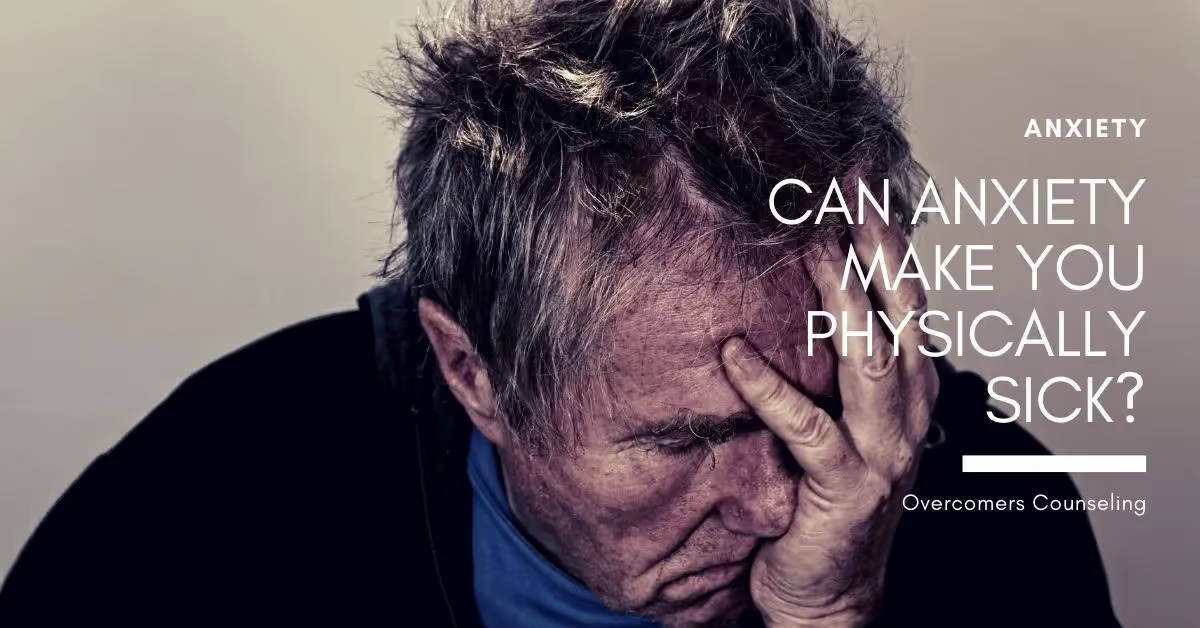The short answer is yes, anxiety can make you physically sick. Too much anxiety can lead to symptoms of physical illness, worsen existing illness, or...

The short answer is yes, anxiety can make you physically sick. Too much anxiety can lead to symptoms of physical illness, worsen existing illness, or pre-dispose you toward illness. Our thoughts, emotions, perceptions, and behaviors all interact with and impact our physical function, and vice versa. The impact of uncontrolled anxiety can threaten your health over time. This is one reason why anxiety must be managed, ideally through a combination of psychotherapy, medication, and lifestyle changes.
Understanding how anxiety effects your body
Anxiety can manifest as a panic attack. A panic attack is a sudden shove into the Fight/Flight/Freeze (F3) mode, or sympathetic arousal.
When we are faced with a threat to our survival, such as a dump truck locking up the brakes six feet away as we cross the street, our Sympathetic branch of our nervous system will activate and put us into F3. The response most conducive to our survival will be to get out of the way, or flee. To facilitate this, we will experience an adrenaline dump.
The adrenal glands sit atop our kidneys. They will release the hormone adrenaline, which will:
This is the F3 response, which gives us the ability to withdraw from a threat, engage a threat, or lock up and be unable to move (Seltzer, 2015).
Depending on the circumstances, any one of these responses can be conducive to our survival.
Once the threat has been escaped, defeated, or left, the F3 response is reversed through the action of the Parasympathetic nervous system.
This has been called the Rest and Digest (R & D) response. Our muscles relax, and heart rate and blood pressure goes down. Our pupils return to the normal size for the amount of ambient light, and our digestion resumes. This interaction between the Sympathetic and Parasympathetic systems maintains a sense of internal equilibrium in our bodies.
Chronic Anxiety & Physical sickness
Here is the problem with anxiety:
Imagine being in that almost- hit- by- a- dump -truck feeling all the time.
It is too much. It is overwhelming. Instead of in balance, we are off-balance.
Chronic lower grade anxiety can wear you down. By the end of the day, you feel exhausted and achy. This is due to muscle tension, and your body working harder than it needs to all day. Anxiety can prevent you from sleeping well, so you don't feel rested the next day, and the cycle gets worse.
Anxiety is an emotion. It must be available in the correct amounts for us to function well.
There are individual differences in how much anxiety one experiences.
Too little anxiety can lead to reckless behavior or a lack of urgency about accomplishing a task. A degree of anxiety motivates you to wear a seat-belt, look both ways when crossing the street, and to delay gratification to get work done.
Too much anxiety can make us sick. We need to be in the Goldilocks Zone – not too much, not too little, but just right- for anxiety to serve us well, instead of making us sick.
American Migraine Foundation. (2020). The Link Between Migraine, Depression and Anxiety. Retrieved March 28, 2020 from https://americanmigrainefoundation.org/resource-library/link-between-migraine-depression-anxiety/
American Psychological Association. (2020). Stress Weakens the Immune System. Retrieved March 28, 2020 from https://www.apa.org/research/action/immune
Choi, J.M. et al . (2018) Association Between Anxiety and Depression and Gastroesophageal Reflux Disease: Results From a Large Cross-sectional Study. Journal of Neurogastroenterolgy and Motility. 24(4): 593–602.doi: 10.5056/jnm18069.
Hedon, F. (2003).Anxiety and erectile dysfunction: a global approach to ED enhances results and quality of life. International Journal of Impotence. Res 15, S16–S19. https://doi.org/10.1038/sj.ijir.3900994
Medical News today. (2020). Can anxiety cause high blood pressure?. Medical News Today. Retrieved March 28, 2020 from https://www.medicalnewstoday.com/articles/327212#anxiety-causing-high-blood-pressure
Medical News today. (2020a). What you need to know about vaginismus . Medical News Today. Retrieved March 28, 2020 from https://www.medicalnewstoday.com/articles/175261
Ranibeer S, and Retu, K. (2011). Stress and hormones. Indian Journal of Endocrinology and Metabolism. 15(1): 18–22. doi: 10.4103/2230-8210.77573.
Saplakoglu, Y. (2019). Can Chronic Stress Cause or Worsen Cancer? Here's What the Evidence Shows. Live Science. Retrieved March 28, 2020 from https://www.livescience.com/65342-chronic-stress-cancer.html
Seltzer, L. (2015). Trauma and the Freeze Response: Good, Bad, or Both? Psychology Today. Retrieved March 28, 2020 from https://www.psychologytoday.com/us/blog/evolution-the-self/201507/trauma-and-the-freeze-response-good-bad-or-both
Society for Endocrinology. (2019). You and your Hormones: Cortisol. Society for Endocrinology. Retrieved March 28, 2020 from https://www.yourhormones.info/hormones/cortisol/
To reduce your anxiety, you can practice relaxation techniques such as deep breathing, progressive muscle relaxation, guided imagery, and mindfulness practices. Additionally, regular exercise has been found to be beneficial in managing stress and improving mental health.
Addressing anxiety is crucial because it can significantly impact your quality of life and overall well-being. Left untreated, anxiety can lead to more severe mental health issues, relationship problems, and difficulty functioning in daily life.
Other activities which have been found helpful in reducing both immediate feelings of anxiousness and long-term anxieties associated with chronic disorders include yoga, journaling, nature walks, art therapy, volunteering, and other low-stress activities. Additionally, developing a healthy lifestyle incorporating adequate sleep, physical activity, and nutritious meals can help reduce overall stress levels.
Yes, Medicaid provides insurance coverage for therapy services specifically designed to help individuals struggling with anxiety, depression, and other mental health conditions.
The duration of anxiety counseling varies for each individual, depending on the severity of their anxiety and their progress in therapy. Our therapists will regularly assess your progress and adjust your treatment plan as needed.
It's important that you feel comfortable discussing personal matters with your therapist in order to open up and get more out of therapy sessions; therefore finding someone who meets certain criteria like experience level, expertise areas, and personality is key when selecting a therapist who can give meaningful feedback about how best handle issues related to anxiety or other mental health concerns.